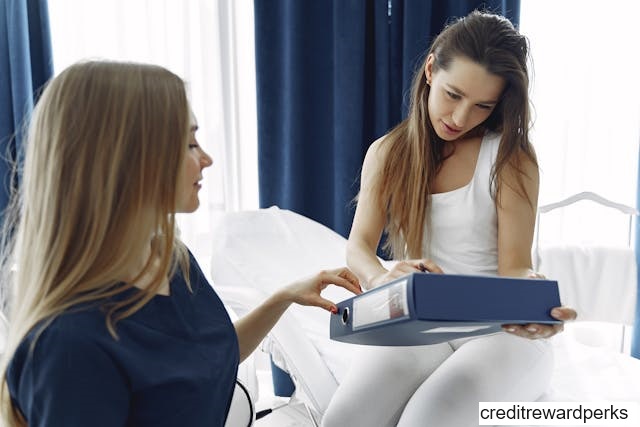As a nurse, I have seen firsthand the importance of having a credit card. Whether it’s for unexpected medical expenses or simply to make everyday purchases, having a credit card can provide a sense of security and financial flexibility. In this article, I will share my personal experience of being a nurse and having a credit card, and how it has helped me in various aspects of my life.
One of the biggest benefits of having a credit card as a nurse is the ability to handle unexpected medical expenses. As someone who works in the healthcare industry, I know how quickly medical bills can add up. Having a credit card with a high enough limit can provide a safety net in case of an emergency or unexpected medical expense. It can also help alleviate some of the stress that comes with worrying about how to pay for medical bills.

In addition to medical expenses, having a credit card has also helped me make everyday purchases more easily. As a busy nurse, I don’t always have time to go to the store and pay with cash or a debit card. With a credit card, I can quickly make purchases online or in-store without having to worry about carrying cash or going to the bank. It has made my life much more convenient and efficient.

I spend $200 per month on work related items. I like having everything on one bill to help me pay and budget. As a nurse, I understand the importance of having the right tools and equipment to provide the best possible care to my patients. From stethoscopes to scrubs, there are many items that I need to purchase regularly to ensure that I am prepared for every shift.

List of credit cards suitable for nurses:
Chase Sapphire Preferred® Card: This card is a real gem for travel lovers! It offers valuable travel rewards and benefits, like bonus points on travel and dining expenses, travel insurance, and access to the Chase Ultimate Rewards program. Perfect for when I’m planning my next adventure!
Citi® Double Cash Card: With this card, I can earn cash back on all my purchases. It has a unique rewards structure where I earn cash back twice—1% when I make a purchase and another 1% when I pay it off. It’s a straightforward way to rack up some cash!
American Express® Gold Card: If I love dining out and grocery shopping, this card is right up my alley. It offers generous rewards in those categories, plus travel benefits and access to the American Express Membership Rewards program. Great for foodies like me!
Bank of America® Cash Rewards Credit Card: This card lets me earn cash back on popular spending categories like gas, groceries, and wholesale clubs. I can even choose my own 3% cash back category, which gives me some flexibility to tailor it to my spending habits.
Capital One® Venture Rewards Credit Card: This travel rewards card gives me miles on all my purchases, allowing me to earn and redeem rewards for flights, hotel stays, and more. It’s got flexible redemption options and some solid travel benefits, making it a great choice for wanderlust-filled folks!
Discover it® Cash Back: This card has rotating quarterly cash back categories, so I can earn 5% cash back on different spending categories throughout the year. Plus, it offers a cash back match at the end of my first year, which is a nice little bonus!
Wells Fargo Propel American Express® Card: This card offers rewards on a wide range of categories, including dining, travel, gas stations, streaming services, and more. It has no annual fee and comes with extra perks like cell phone protection—definitely a win!
Barclaycard Arrival Plus® World Elite Mastercard®: This one’s for the frequent travelers! It offers rewards on all purchases that can be redeemed for travel statement credits. Plus, it doesn’t charge foreign transaction fees, making it perfect for when I’m jet-setting around the globe.
U.S. Bank Cash+™ Visa Signature® Card: With this card, I can pick my own 5% cash back categories that fit my spending style. It also offers a 0% introductory APR period on balance transfers, which is handy if I need to manage some expenses.
Navy Federal Credit Union® cashRewards Credit Card: This card is exclusively for members of the Navy Federal Credit Union. It gives me cash back on every purchase, plus benefits like no balance transfer fees and no foreign transaction fees. It’s a solid choice for those who qualify!


Specs and Features to look for
Medical Professional Credit Cards: There are some credit cards out there specifically designed for medical professionals, including nurses like me. These cards recognize the hard work we put into the healthcare industry and come with benefits that fit our profession. I can earn extra rewards or snag discounts on healthcare-related expenses that really help out my budget. For instance, the Nurse Rewards Card might offer increased rewards on purchases like scrubs, nursing equipment, or continuing education courses. Using this card for my professional needs means I can rack up rewards faster and enjoy some exclusive perks.
Cash Back or Rewards Credit Cards: As a nurse, I make regular purchases that can qualify for cash back or rewards. I should consider credit cards with generous rewards programs that let me earn points, miles, or cash back on my everyday spending. These rewards can be redeemed for travel, gift cards, merchandise, or statement credits, giving me more financial flexibility. The Healthcare Heroes Cash Back Card, for example, might give me extra cash back on groceries, dining, and gas—catering to my essential needs. By using this card for my daily expenses, I can accumulate cash back and enjoy the rewards I deserve.
Low Interest or 0% Introductory APR Credit Cards: If I think I’ll be carrying a balance on my credit card, it’s smart to prioritize low-interest rate cards or those with a 0% introductory APR period. These cards can save me on interest charges and give me some breathing room to pay off my balance without piling on excessive interest. The Nurse Financial Freedom Card might offer a competitive interest rate or a nice long 0% intro APR period. By using this card wisely, I can manage my finances better and ease the burden of interest payments.
Travel Credit Cards: If I love to travel or often have to commute for work, travel credit cards can be super beneficial. They offer perks like airline miles, hotel rewards, airport lounge access, and travel insurance. Picking a card that aligns with my favorite airlines or hotel chains helps me maximize the benefits and enjoy some well-deserved trips or work conferences. The Nurse Explorer Travel Card, for instance, rewards me with airline miles on every purchase. By stacking up those miles, I can unlock some exciting travel opportunities!
Student Credit Cards: For nursing students or recent grads, student credit cards can be a great option. These cards cater to those with limited credit history and often provide rewards tailored to student expenses, like textbooks and school supplies. They help me build credit while managing my finances responsibly. The Nurse-in-Training Student Card might offer rewards on education-related expenses, giving me a solid start in building my credit history and keeping my student budget in check.
Balance Transfer Credit Cards: If I’ve got some existing credit card debt, a balance transfer credit card can help me consolidate and manage it more effectively. I’ll want to look for cards that offer low or 0% introductory APR on balance transfers for a good stretch of time. This can save me on interest charges while I work on paying off my debt. For example, the Nurse Balance Transfer Card might provide a promotional period with no interest on balance transfers for 12 months. By moving my balances from high-interest cards to this one, I can simplify my payments and focus on reducing my debt.
Fraud Protection and Security Features: Since nurses deal with sensitive personal and financial info daily, having credit cards with strong fraud protection and security features is a must. I should look for cards that offer advanced security measures like EMV chip technology, tokenization, and real-time transaction monitoring. These features give me peace of mind and protection against unauthorized transactions.
Financial Wellness Resources: I’ll keep an eye out for credit cards that provide extra resources to support my financial well-being. Some issuers offer financial education tools, budgeting apps, or access to credit score monitoring services. These resources can help me make informed financial decisions, keep track of my expenses, and improve my overall financial health.
No Foreign Transaction Fee Cards: If I travel internationally for work or leisure, I should consider credit cards that waive foreign transaction fees. Those fees can add up fast, so having a card that eliminates them can save me money on purchases made outside the country.
Special Discounts or Benefits: Some credit cards offer exclusive discounts or benefits tailored to healthcare professionals. These could include discounts on scrubs, medical supplies, or access to professional development resources. I’ll be on the lookout for cards that team up with healthcare organizations or offer perks specifically for nurses.



Here’s a more detailed breakdown of the expenses I face as a nurse:
-
Scrubs and Uniforms:
- Cost: Quality scrubs can range from $30 to $50 or more per set. I usually buy several sets to rotate through my shifts, which can add up quickly.
- Considerations: I look for scrubs that are comfortable, durable, and have pockets for my tools. Some hospitals have specific color codes or styles, so I often need to keep that in mind when shopping.
-
Medical Equipment and Supplies:
- Cost: A good stethoscope can cost anywhere from $50 to $200, depending on the brand and features. Blood pressure cuffs and other small tools may add another $20 to $100.
- Considerations: Quality matters, as I rely on these tools daily. I might also need to replace items periodically, which adds to the overall cost.
-
Continuing Education:
- Cost: Online courses or certification programs can range from $50 to several hundred dollars. Some advanced certifications may even cost over $1,000.
- Considerations: Many states require continuing education hours for license renewal, so I plan for these expenses as part of my professional development.
-
Meals and Snacks:
- Cost: Eating at the hospital cafeteria or nearby restaurants can cost $10 to $15 per meal. If I work long shifts, I might spend $30 or more a day on food.
- Considerations: I try to bring snacks or meals from home to save money, but it’s not always possible, especially during busy shifts.
-
Gas and Transportation:
- Cost: If I drive to work, gas expenses can range from $20 to $100 a month, depending on how far I live from my workplace. Public transportation costs vary but can also add up.
- Considerations: I sometimes work at multiple locations, which can increase my transportation costs.
-
Healthcare-related Expenses:
- Cost: Co-pays for doctor visits can range from $10 to $50, depending on my insurance plan. Prescription medications can vary widely in cost.
- Considerations: I prioritize my health, so I make sure to budget for these necessary expenses.
-
Work-related Accessories:
- Cost: Comfortable, supportive shoes are crucial and can cost $50 to $150. I might also invest in a reliable watch, which can range from $20 to $100.
- Considerations: Since I’m on my feet for long hours, I look for shoes that provide good arch support and durability.
-
Personal Care:
- Cost: I spend on toiletries, skincare products, and wellness items, which can add up to $30 to $100 a month, depending on my needs.
- Considerations: Staying healthy and feeling good is important for my performance at work, so I don’t skimp on these items.
-
Travel for Conferences or Training:
- Cost: Attending conferences may involve registration fees ($100 to $500), plus travel expenses like flights, hotels, and meals, which can total several hundred to thousands of dollars.
- Considerations: These events are valuable for networking and learning, so I try to budget for them as part of my professional growth.
-
Gifts and Donations:
- Cost: I might spend $20 to $50 on gifts for colleagues during holidays or special occasions, and I often contribute to health-related charities or causes.
- Considerations: Giving back is important to me, especially in the healthcare field, so I make it a part of my budget.





As a nurse I carry min cash, and 2 cc. I use for purchasing scrubs, shoes, and other work attire. I need fresh greens every 6m. I also need to pay for professional liability insurance and membership fees for nursing organizations, and pay that online. I like to run a report at end of year for all my expenses.
Use it for scopes, pills, lunch, and travel. Med professionals have big expenses like uniforms, ongoing training, and other stuff. I spend about 100/m USD but it is ok because the income is solid. I use a cap one venture card.
I use my BofA mc for all medical related charges. I need to buy medical supplies or equipment for my job, especially when I’m working in home healthcare. I buy textbooks, snacks, gadgets, chargers, pens, shoes, and scrubs.
As a nurse, I use Marriott Bonvoy Boundless Credit Card, Capital One Platinum Credit Card, Chase Sapphire Reserve, and Amex Gold. I rotate usage and really try to pay full balance, always. When I broke my finger I could not work for 2 months, cash was low, I got by using cards. Since then I have paid all cards off. It feels good to know they are there if needed.
I took some udemy medical related courses an paid using capone visa. Then I have a record of payment so I can turn in for reimbursement. I would get an amex too, I had one in the past but did not use as much. Do any of these have special perks for medical workers? Let me know, Jill.
I am not a nurse but why do they need own card?
All cards offer rebates and points and not matter what you do.
The only reason I can think of is if you get a custom pic on the card, ok then, do it. It is personalized, and a conversation piece.
Hey, my gear includes lotion, cell, laptop, med apps, vpn, charger, extra battery, tablet, textbook, watch, sanitizer, and backpack.
I use a card so its easy to calculate total spend.
As a nurse I eat out everyday, and always use a card.
I spend less than I make so no worries.
I recommend Capital One QuicksilverOne, I have one, it is decent.
My backup is Chase Freedom Unlimited, IMHO almost as good. Not much differnet.